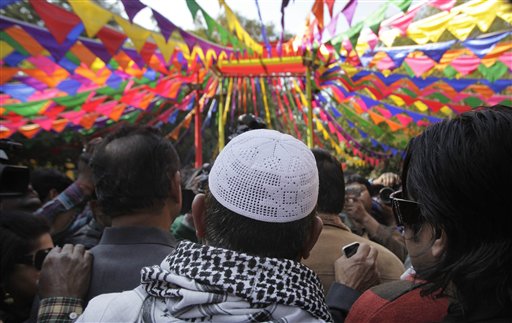Literacy and book pop culture: A global survey
By

Literacy and book pop culture: A global survey
By
This month WBEZ’s Front & Center has been taking an in-depth look at the impact of low-literacy in the Great Lakes region. As they wrap up their coverage of how reading and writing skills impact Americans’ chances for academic success and employment, Worldview looks at the culture of literacy in India, Latin America and Afghanistan.
India: Where writers are stars
India’s book industry is booming – English language authors are treated like Bollywood stars, complete with lines for autographs and coverage by the paparrazi. Chetan Baghat, India’s all-time best selling author, has over 930,000 followers on Twitter and two Bollywood adaptations under his belt.
India’s glamorous book festivals have become so popular in the international literary scene that even Oprah Winfrey attended one of this year’s festivals. While authors hold fancy book release parties in the western tradition, most of the country is still buying books out of stacks in road side stalls. And in Rajasthan, the western state which hosts one literary festival, the literacy rate is only 64 percent – well below the national average of 74 percent, according to a 2011 census.
Naresh Fernandes, former Editor-in-Chief of Time Out Bangalore, and author Vikram Chandra fill us in on the state of reading and writing in India.
Latin America: Where books are status objects
As is the case in India, in much of Latin America, book fairs are celebrity events akin to Hollywood film premiers. Magazines and books, especially in provinces outside the cities, are held in extremely high regard.
Accessibility is on the rise due to an improving economic climate in Latin America. Development has also led to a new rash of emerging journalists and non-fiction writers. Award-winning author Daniel Alarcón believes this comes from a growing need for self-interpretation. Alarcón has spent extensive time immersed in the literary culture of Peru and other Latin American countries, and observes noticeable differences between those countries and the United States. He joins Worldview to enumerate some of those differences.
Afghanistan: Where literacy is a national security issue
The U.S. and NATO hope to build up the Afghan military and leave the country in their hands by 2014. Afghans are participating: People want a paycheck, so they’re joining the armed forces and the police.
But there’s a major piece missing. It’s estimated that only 28 percent of the Afghan population can read. Literacy rates among Afghan forces recruits are even lower, estimated at about 10 to 15 percent.
Reporter Heath Druzin has seen the illiteracy problem up close. His recent article for Stars and Stripes details how many Afghan recruits must start from scratch, and learn how to read and write. They don’t need great computer skills – they’re flying mostly old Russian helicopters – but they must still write flight logs and read repair manuals. And, if soldiers and police can’t read ID badges, they don’t know who should be allowed through security checkpoints. Illiteracy can somethings bring things to halt. Druzin said if an Afghan Humvee breaks down, it sometimes sits there because no one can read the repair manual.
Druzin joins Worldview to explore the depth of the problem.